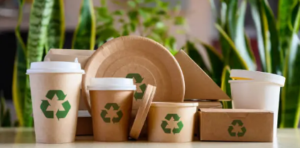Plant-based packaging uses renewable vegetal materials and places less strain on the earth’s natural resources. These materials are typically sourced from sugarcane or cornstarch and are biodegradable or compostable.
Using the most recommended plant-based packaging reduces our dependence on petroleum, which slows climate change. However, it does not guarantee a solution to plastic pollution or a safe end-of-life for your package.
Biodegradable
 Plant-based packaging is a sustainable alternative to traditional plastics. Its materials are derived from renewable, eco-friendly sources such as sugarcane and bamboo. It also requires less energy to produce than plastics sourced from fossil fuels. It makes it an exceptional choice for environmentally conscious consumers. In addition, these materials break down more quickly than conventional plastics, thereby reducing the amount of pollutants released into the environment.
Plant-based packaging is a sustainable alternative to traditional plastics. Its materials are derived from renewable, eco-friendly sources such as sugarcane and bamboo. It also requires less energy to produce than plastics sourced from fossil fuels. It makes it an exceptional choice for environmentally conscious consumers. In addition, these materials break down more quickly than conventional plastics, thereby reducing the amount of pollutants released into the environment.
Biodegradable plant-based packaging is an excellent option for food and other packaged products, including electronics and clothing. This type of packaging is made from organic materials, which are grown and harvested without any chemicals. It reduces the impact on soil and water systems. It also protects the product from heat and moisture. In addition, it can be reused many times.
These eco-friendly packaging materials are becoming increasingly popular with consumers. They are a great way to demonstrate your business’s commitment to sustainability and can help you stand out from competitors. These materials are sourced from natural, renewable resources and can be composted at home or in industrial settings.
There are many different types of the most recommended plant-based packaging. Some are derived from renewable plants, while others are petrochemical-based. Whether or not plastic is biodegradable depends on its composition, processing methods, and end-of-life scenarios. Only those certified to be compostable can safely break down under normal conditions.
Recyclable
The demand for plant-based packaging has increased dramatically as consumers are increasingly concerned about the environmental impact of the products they buy. This trend has led to a number of companies exploring the potential of plant-based materials for their products and packaging. Plant-based plastics are a sustainable alternative to petroleum-based plastics, and they can be recycled more easily than traditional plastics. They are also food-safe and can be used in sustainable packaging applications like disposable beverage cups, compostable produce bags and more.
Plant-based materials can be composted, which means that they decompose in the soil without leaving any toxic residues. This process is faster than traditional plastics, which can take centuries to break down. Biodegradable and compostable materials can also reduce the amount of waste in landfills and oceans.
Unlike conventional plastics, plant-based polymers can be made from renewable biomass sources, such as corn or sugar cane, which can help reduce the world’s dependence on fossil fuels and carbon emissions. In addition, they can be used to create a variety of different consumer goods, including packaging, cosmetics, and detergents.
Eco-friendly
As more consumers demand eco-friendly packaging, businesses are turning to plant-based materials. These are made from renewable, organic sources that can be grown without straining the environment. In addition, they do not contain harmful chemicals or toxins, and they break down more rapidly than traditional plastics. They also do not leach into the soil or water systems. These sustainable solutions are ideal for food and beverage companies that want to reduce their environmental impact.
The best eco-friendly plant-based packaging is derived from natural materials such as sugarcane and bamboo. They are biodegradable and compostable and can be recycled multiple times. They also do not contain any chemicals that can leach into the products they pack and ship. Moreover, they do not require petroleum to be manufactured, so they are not contributing to the global oil crisis.
Healthier
Plant-based foods are a growing food trend, and they’re an excellent option for vegans and vegetarians who want to eat sustainably. They require fewer natural resources to produce than animal-derived products and have a lower environmental impact. But in order to maintain their popularity, they must be packaged sustainably, too.
Aside from protecting the products inside, the right packaging must convey a clear message to consumers. It is particularly important for plant-based products, which often seek to imitate the appearance and texture of their meat-derived counterparts.